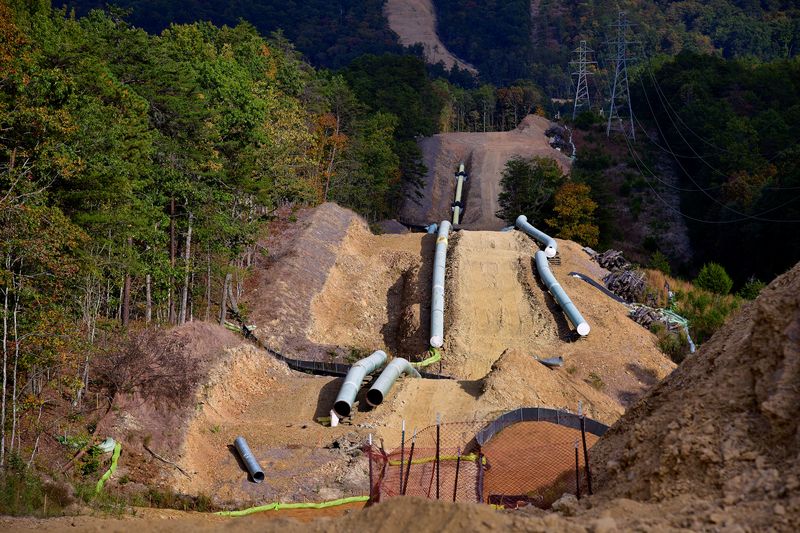NextEra takes $800 million charge for WV-VA Mountain Valley natgas pipe By Reuters
[ad_1]
 © Reuters. FILE PHOTO: Lengths of pipe wait to be laid in the ground along the under-construction Mountain Valley Pipeline near Elliston, Virginia, U.S. September 29, 2019. Picture taken September 29, 2019. REUTERS/Charles Mostoller
© Reuters. FILE PHOTO: Lengths of pipe wait to be laid in the ground along the under-construction Mountain Valley Pipeline near Elliston, Virginia, U.S. September 29, 2019. Picture taken September 29, 2019. REUTERS/Charles Mostoller(Reuters) – NextEra Energy Inc (NYSE:) said one of its units recorded an $800 million impairment charge in the first quarter as the U.S. renewable energy company re-evaluates its investment in the long-delayed Mountain Valley pipeline from West Virginia to Virginia.
NextEra said in a U.S. Securities and Exchange Commission filing on Friday that its NextEra Energy Resources unit and other Mountain Valley joint venture partners continue to evaluate options and next steps for the project.
The U.S. Court of Appeals for the Fourth Circuit over the last month has invalidated key permits for the project issued by the U.S. Fish and Wildlife Service and the U.S. Forest Service.
The court rulings were the latest setback for the pipeline, which is years behind schedule and billions of dollars over budget.
Several analysts have said the court decisions would likely delay the project startup until 2023 or 2024.
Before the latest setbacks, Equitrans Midstream (NYSE:) Corp, the project’s lead partner, said it expected the pipeline to cost about $6.2 billion and enter service in the summer of 2022.
Equitrans said in January it was “evaluating the project’s next steps and timing considerations,” noting total work on the pipeline was “nearly 94% complete.”
Mountain Valley is one of several U.S. pipeline projects delayed by regulatory and legal fights with environmental and local groups which found problems with federal permits issued during President Donald Trump’s administration.
When Mountain Valley construction started in February 2018, Equitrans estimated the 303-mile (488-km), 2-billion-cubic-feet-per-day (bcfd) project would cost about $3.5 billion and enter service by late 2018.
Equitrans has a 47.8% ownership interest in Mountain Valley and will operate the pipeline.
The Mountain Valley venture is owned by units of Equitrans, NextEra, Consolidated Edison Inc (NYSE:), AltaGas (TSX:) Ltd and RGC Resources Inc.
Fusion Media or anyone involved with Fusion Media will not accept any liability for loss or damage as a result of reliance on the information including data, quotes, charts and buy/sell signals contained within this website. Please be fully informed regarding the risks and costs associated with trading the financial markets, it is one of the riskiest investment forms possible.
[ad_2]
Source link
 © Reuters. FILE PHOTO: Lengths of pipe wait to be laid in the ground along the under-construction Mountain Valley Pipeline near Elliston, Virginia, U.S. September 29, 2019. Picture taken September 29, 2019. REUTERS/Charles Mostoller
© Reuters. FILE PHOTO: Lengths of pipe wait to be laid in the ground along the under-construction Mountain Valley Pipeline near Elliston, Virginia, U.S. September 29, 2019. Picture taken September 29, 2019. REUTERS/Charles Mostoller(Reuters) – NextEra Energy Inc (NYSE:) said one of its units recorded an $800 million impairment charge in the first quarter as the U.S. renewable energy company re-evaluates its investment in the long-delayed Mountain Valley pipeline from West Virginia to Virginia.
NextEra said in a U.S. Securities and Exchange Commission filing on Friday that its NextEra Energy Resources unit and other Mountain Valley joint venture partners continue to evaluate options and next steps for the project.
The U.S. Court of Appeals for the Fourth Circuit over the last month has invalidated key permits for the project issued by the U.S. Fish and Wildlife Service and the U.S. Forest Service.
The court rulings were the latest setback for the pipeline, which is years behind schedule and billions of dollars over budget.
Several analysts have said the court decisions would likely delay the project startup until 2023 or 2024.
Before the latest setbacks, Equitrans Midstream (NYSE:) Corp, the project’s lead partner, said it expected the pipeline to cost about $6.2 billion and enter service in the summer of 2022.
Equitrans said in January it was “evaluating the project’s next steps and timing considerations,” noting total work on the pipeline was “nearly 94% complete.”
Mountain Valley is one of several U.S. pipeline projects delayed by regulatory and legal fights with environmental and local groups which found problems with federal permits issued during President Donald Trump’s administration.
When Mountain Valley construction started in February 2018, Equitrans estimated the 303-mile (488-km), 2-billion-cubic-feet-per-day (bcfd) project would cost about $3.5 billion and enter service by late 2018.
Equitrans has a 47.8% ownership interest in Mountain Valley and will operate the pipeline.
The Mountain Valley venture is owned by units of Equitrans, NextEra, Consolidated Edison Inc (NYSE:), AltaGas (TSX:) Ltd and RGC Resources Inc.
Fusion Media or anyone involved with Fusion Media will not accept any liability for loss or damage as a result of reliance on the information including data, quotes, charts and buy/sell signals contained within this website. Please be fully informed regarding the risks and costs associated with trading the financial markets, it is one of the riskiest investment forms possible.